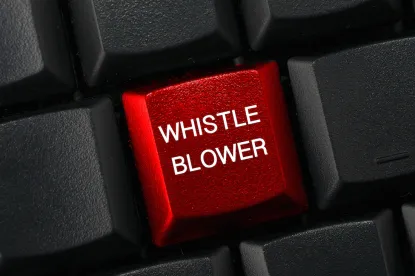Is Brady staying or going? Maine employers recently got a highly suggestive indication that he may be on his way out. Brady has been confusing defenses for years, so if he’s gone, that may be a good thing, if it’s actually true. The reason: he’s costing employers money by increasing their risk associated with whistleblower claims.
This Brady is not Tom of NFL fame, but Gerald of Law Court notoriety. A detective with the Cumberland County Sheriff’s Department, Gerald was a plaintiff in a whistleblower claim against the county arising out of his demotion. His case made it to the Law Court and that’s where the trouble started.
For almost 50 years, virtually all employment discrimination claims have been analyzed according to a three-step process. In the whistleblower context, this worked as follows: First, a plaintiff was required to produce enough evidence to show that a rational basis existed for a jury to conclude that s/he engaged in protected activity and suffered an adverse employment action, and that the protected activity motivated, or caused, the adverse action. Second, if the plaintiff could show this, the employer then had the burden of producing evidence that there was a legitimate, non-retaliatory reason for the adverse action. Third, the burden then shifted back to the plaintiff to show that the employer’s reason was a pretext intended to conceal an unlawful reason. Maine courts have long followed this process.
In Brady v. Cumberland County, 2015 ME 143, the Law Court dispensed with this process for whistleblower claims, but did so in a way that left defense lawyers wondering what they were seeing. The Brady opinion seemed to say that if a plaintiff could show the three elements of a whistleblower claim noted above, the case went to trial regardless of what the defense had for evidence of a legitimate reason for the adverse action. Let’s call this bad Brady. Plaintiff’s attorneys have been arguing this ever since Brady was decided
However, near the end of the opinion, the court seemed to backtrack from that extreme position, saying that “[e]limination of the burden-shifting process does not limit the scope of the evidence presented in summary judgment practice in WPA retaliation cases…” In other words, the court will still look at the employer’s side of the story. This statement seems to contradict the part of the opinion that says the employer’s evidence is irrelevant at the summary judgment stage. Let’s call this good Brady.
To summarize, bad Brady means higher costs for employers to resolve whistleblower cases, because if a plaintiff has no risk of losing on summary judgment, s/he will always demand more money to settle. Good Brady, on the other hand, preserves at least the possibility that many whistleblower cases could be dismissed at the summary judgment stage, lowering the average overall cost of resolution. Either way, the court could be whistled for too many Bradys on the field.
Other courts trying to read Brady’s intent have struggled with this apparent contradiction. Last year, we defended the appeal of a summary judgment before the U. S. Court of Appeals for the First Circuit, in which the employee’s attorney argued that the court should follow bad Brady and ignore the employer’s evidence. We successfully argued that the following scenario demonstrated that this interpretation of Brady made no practical sense: Suppose an employee blows a whistle on Tuesday, and is fired on Thursday. Under bad Brady, the employee is automatically entitled a trial – even if he shot the boss on Wednesday. Under good Brady, the court can grant summary judgment if it concludes that no rational juror would believe that even though the employee shot the boss, the real reason he was fired was for blowing a whistle. Any other result would, of course, defy common sense. The U.S. appeals court agreed with our view, but Brady is a child of the Maine Law Court which has the final say on its meaning.
What has changed to make us think that Brady’s day in the Maine sun may be over? In January 2020, the Law Court denied an employee’s appeal of a summary judgment for the employer in a whistleblower case. The court quoted the good Brady language noted above, analyzed the employer's explanation for taking the adverse action, and made no mention of the bad Brady concept of ignoring that evidence. Pushard v. Riverview Psychiatric Center, 2020 ME 23, ¶24. This decision could be an indication that the Law Court has seen the need to re-level the playing field.
If good Brady wants to stick around, as the Pushard decision suggests he might, we would be thrilled. But if bad Brady is what we’ll get, it’s time for him to move on. Maine employers just can’t afford to pay him.


 />i
/>i

